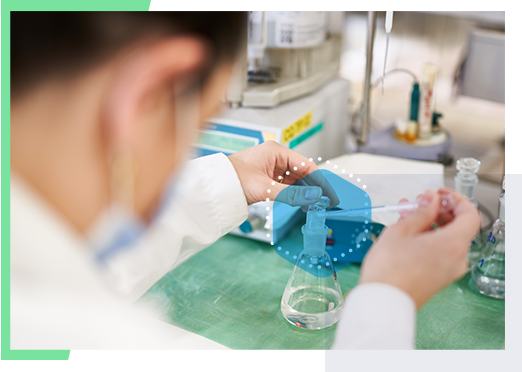Products
Overview
We manufacture a wide range of hydrolysates, ingredients for every need, from lab research to industrial scale.

Peptones and magnesium
with a pharma focus

Reliability, stability and traceability
Throughout the years, we have managed to adapt to the many requirements of our customers. We now offer more than eighty references, with tracaility des MP and growth performance consistency.
Vegetable hydrolysates
Vegetable Peptones are manufactured by enzymatic hydrolysis of selected vegetal raw materials rich in proteins.
The enzymatic preparations traditionally used have long been based on natural active materials such as Papain (an extract from the Papaya Tree Latex). Biotech enzymes obtained by fermentation are more and more in use nowadays.
The selection of the vegetal raw materials is a challenging task. Besides offering physico chemical properties adequate for an efficient hydrolysis process, the raw materials must be available on the long term on a worldwide basis.
Organotechnie has set up a whole range of tests to ensure the raw material properties consistency, despite their potential natural variability with time.
Casein hydrolysates
Casein Peptones are manufactured by enzymatic hydrolysis of cow milk phospho proteins.
The enzymatic preparations traditionally used have long been based on natural active materials such as Pancreatin. Biotech enzymes obtained by fermentation are more and more in use nowadays. In order to avoid any BSE contamination, Organotechnie exclusively uses milk proteins produced in unaffected countries such as New Zealand. Moreover, the casein we use comes from milk intended for human consumption and complies with the requirements of the regulatory agencies.
Meat hydrolysates
Meat Peptones are manufactured by enzymatic hydrolysis of selected animal tissues The enzymatic preparations traditionally used have long been based on natural active materials such as Pancreatin or Pepsin.
Traditionally beef animal tissues have been used for the manufacturing of Peptones or Hydrolysates because these materials are widespread the world over at affordable costs. bovine or pork animal tissues are used, or a combination of these. Due to the outbreak of the BSE and the precautionary measures that were enforced thereafter and in particular within the pharmaceutical industry, the use of beef material had become questionable until guidelines regarding « the risk of transmission of TSE diseases » were issued by the competent authorities in year 2000. Organotechnie Meat Peptones comply with those guidelines, and beef materials are sourced from unaffected countries such as New Zealand or Australia. Our meat peptones come with a certificate of suitability vs TSE risk.
Biotech enzymes obtained by fermentation are more and more in use nowadays.
Gelatin Peptones are manufactured by enzymatic hydrolysis of selected European pig gelatin. Gelatin Peptones offer a particular growth promotion profile and their use is mostly in the diagnostic area for select media.
Yeast extracts
Our yeast extracts are manufactured by autolysis of a selected strain of Saccharomyces cerevisiae. They are guaranteed non-GMO and animal free.

Malt Extracts
Our yeast Extracts are manufactured by autolysis of a selected strain of Saccharomyces cerevisiae. They are guaranteed non-GMO and animal free.
Our range of Malt Extracts, which are water soluble extracts manufactured from malted barley and are used as a excellent carbohydrate source ingredient in the manufacturing of Dehydrated Culture Media and Fermentation Media.
Magnesium Pidolate API
Magnesium Pidolate or Magnesium Pyrrolidone Carboxylate is a salt of Pyroglutamic Acid manufactured by chemical synthesis. Its molecular formula is C10H12N2O6Mg. Organotechnie product complies to the Monograph 1619 of the European Pharmacopoeia latest Edition. The Pharmaceutical industry uses Magnesium Pidolate to manufacture drugs for patients who suffer from Magnesium deficiencies. Magnesium Pidolate is also used as a supplement in the Nutraceutical and the Animal Nutrition industry.
It is obtained by cyclisation of Glutamic Acid, thus our salt becoming highly bioavailable with excellent tolerance. It has a high absorption rate, so it can easily be converted into a liquid supplement. It is used to restore magnesium levels in magnesium deficient animals. Has a key role in producing energy.




